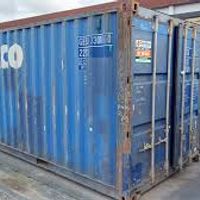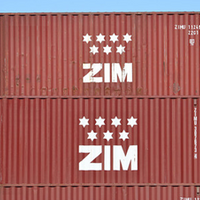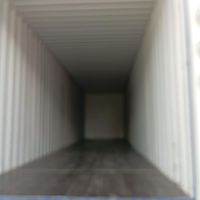Understanding container conditions is crucial when choosing the correct containers for your needs, whether it be for shipping or storage. In this blog, we’ll outline the different grades and conditions, so that you know exactly what to look out for when selecting units.
If you already know what container condition you require, you may have encountered another obstacle: sourcing equipment in a specific condition, at prices that suit your budget. Luckily, we’ve got the perfect solution for you.
We’re Container xChange, an online container marketplace for buying shipping containers of all types and sizes. We’ve got 100,000+ quality containers available in over 2,500 unique locations. So you’ll have no problem sourcing the exact containers you’re looking for, anywhere in the world on our platform.
Curious to see how our marketplace works? Check it out right now! Simply type in the container type you’re after, plus your location to browse and compare shipping container offers today.
9,302 results found on the platform.
Container prices start from $400/unit.
Currently no match for your search
Change your search criteria or fill out the form below to get notified via email when there is a new match for you on xChange!
-
Pick-up

20DC (Cargo worthy)
3 units available
YOM:
Year of manufacture:
2004
2010
Savannah, GA
per container
Non-negotiable price$
1090
-
Pick-up

20DC (Cargo worthy)
6 units available
YOM:
Year of manufacture:
2004
2010
Savannah, GA
per container
Non-negotiable price$
1090
-
Pick-up

40HC (Brand new)
20 units available
YOM:
Year of manufacture:
2024
2024
Yekaterinburg, Sve
per container
Negotiable price$
1800
Showing 3 of 9,302 results
Load more()
YOM:
Year of manufacture:
per container
$
From brand new to WWT: An overview of container conditions
Let’s get a quick overview of the main differences between new, excellent, cargo-worthy, WWT and as-is equipment.
| Brand new (1-trip/factory) | Excellent condition (multi-trip/IICL) | Cargo-worthy | WWT | As-is | |
| Wind & Watertight | Yes | Yes | Yes | Yes | Not guaranteed |
| Suitable for exports | Yes | Yes | Yes | Not suitable for frequent cargo moves | No |
| Suitable for storage | Yes | Yes | Yes | Yes | With repairs |
| Dents & scratches | Minimal dents and scratches | Minor dents and scratches | Some surface dents, scratches and rust | Dents, repairs and surface rust acceptable | Significant damage to the roof and/or walls |
| Paint on body | 100% original paint | 95% in original paint | Paint touch-ups (non-matching colors could have been used) | Faded, acceptable | Faded, acceptable |
| Doors functional | Yes | Yes | Yes | Yes | Not guaranteed |
| Standards | IICL-6 Valid CSC plate |
IICL-5 or 6 Valid CSC plate |
Valid CSC Plate | No standards | No standards |
| Floors free of holes | Yes | Yes | Yes | Yes | No |
Now that you’ve got the basics, let’s go into more detail on each shipping container grade and what it’s best suited for, so that you can decide which container condition you need.
Brand new containers (1-trip/factory)
New shipping containers offer the highest quality, have made a maximum of one trip, and are a maximum one year old.

Here’s what you can expect from a brand new (1-trip/factory) container:
- Structurally sound, with minimal dents/scratches
- Offers IICL-6 standard and comes with a valid CSC plate
- Completely sealed, with zero daylight visibility from inside the container when closed
- No toxic materials transported in the container in the past
Check out deals on brand-new shipping containers in your location today!
Excellent condition (multi-trip/IICL)
Multi-trip containers are in excellent condition and meet the standards and specifications set by the Institute of International Container Lessors (IICL).
Here’s what an excellent (multi-trip/IICL) container looks like:
- Structurally sound, with minor dents and scratches
- Meets IICL-5 or 6 standards
- Has a valid CSC Plate
- Often food grade, but not guaranteed (inspection for food grade cargo is recommended)
Cargo-worthy containers
Cargo-worthy (CW) means that the shipping container is deemed suitable to transport cargo. So, if you have cargo to send out and you’re not fussy about the container being shiny new, a cargo-worthy shipping container will do the trick. Plus, it’s a lot cheaper than new containers.

Here’s what you can expect from a cargo-worthy shipping container:
- A valid CSC plate
- Minimum 50% mark-free interior with some scuffing, scratching, and minor surface rust
- Floors may have minor delamination or stains from previous cargo. But no toxic contamination
- Ideal for shipping cargo but usually not food-grade
Get cargo-worthy shipping containers under $1,000 on the Container xChange marketplace.
WWT containers
A container is wind and water-tight if no wind or water can penetrate through the roof, walls, or doors. They’re often used as storage containers.
With a WWT container, you can expect the following:
- Older than 10-15 years
- Extensive markings, corrosion, scratches, and major rust
- Marked floors with moderate delamination. Significant wear of the floor
- Usually some damage
- May not have a CSC plate
Does one or more of these container conditions sound perfect for your needs? Then it’s time to start finding the units you need safely, at prices you’ll love on xChange. Click the banner below to choose from 100,000+ containers.
As-is container
As-is containers are damaged containers that have been taken out of commission in the shipping industry. These containers may be suitable for non-transport uses, but are often considered metal scrap.
Why are container conditions important?
When sourcing containers, it’s necessary to understand conditions for a number of reasons:
Suitability: Different container conditions are better suited to specific purposes. For example, if you’re transporting expensive cargo, you probably don’t want a container that’s transported toxic waste or chemicals in the past.
In this case, you should opt for a new container. And for food items, you should always choose a food-grade shipping container in order to maintain product purity.
If you want storage shipping containers, on the other hand, opt for old shipping containers that are sealed and structurally sound. These will do the trick perfectly for a much more affordable price.
Regulatory compliance: Containers need to comply with regulations set by the International Organization for Standardization (ISO) to be deemed fit for shipping. Understanding the conditions required for specific uses is crucial for avoiding fines and penalties.
Negotiation power: Knowing the different container conditions and what to look out for can also help you negotiate a fair price when you buy a shipping container. On the Container xChange platform, for example, you can negotiate the shipping container costs directly with the supplier.
What’s more, you get 7 days after the release of containers to check the conditions. If a container you receive does not meet the agreed criteria, we will provide support and mediation.
How to keep your shipping containers in good condition
It’s one thing to buy containers in good condition, but you’ve also got to make sure they stay that way. Here are a few tips to ensure you keep your containers in great shape so that you can use them for as long as possible.

Regular inspections: Regular inspections help you to stay on top of shipping container repairs before they turn into major issues. Regular inspections play a crucial role in ensuring your equipment is covered by insurance. Failure to meet inspection requirements could mean your claims are denied.
Frequent repairs: As we mentioned above, keeping on top of minor repairs is wise and prevents issues from becoming unmanageable. This is because problems like holes and rust can worsen drastically over time, requiring more resources and cash to fix.
Service reefers often: If you have reefer containers, it’s even more important to service and maintain them than with regular containers. Reefers have intricate machinery that can be very costly to fix. So it’s better to spend money on regular services and maintenance than shelling out a fortune to fix major problems.
Buy shipping containers on xChange in 4 easy steps
Now that you know all about the different container conditions let’s explore the simple steps to buying shipping containers on the Container xChange platform.
Decide on your criteria: Besides the container condition, you’ll also need to figure out the container type and size you need. What’s more, make sure you know what sort of price you’re willing to shell out before you start browsing.
Browse offers: Once you know exactly what you’re looking for, it’s time to hop onto the Container xChange trading platform and start finding the containers you need. You can browse and compare multiple offers at the same time, to make sure you’re choosing the best deal for your budget.
Finalize the deal: Once you’ve found an offer you like, it’s time to connect directly with the supplier to discuss the finer details. Not happy with the price? You can negotiate to make sure you’re comfortable with the amount you’re shelling out.
Make safe payments: Once everything is finalized, it’s time to make the payment. Luckily, you can do this securely on the platform itself using the xChange Wallet.
Ready to buy containers in the conditions you need, at prices that suit your budget? Then Container xChange is the perfect online solution for you. Here are just a few of the benefits you can expect as a member:

So how do you get started? It’s so simple! Just click below to sign up for a free demo of the trading platform today, and get the chance to ask any burning questions you might have. You’ll be finding units in various container conditions from reliable suppliers in no time at all.
Frequently Asked Questions (FAQs)
What is a container inspection checklist?
The ISO inspection checklist is used to assess the structural integrity of a shipping container. If a container passes the ISO inspection, it is deemed fit to transport cargo across the ocean. This inspection helps to prevent damaged and unsafe containers from leaving shipping ports.
What is a cargo-worthy container?
A cargo-worthy container is structurally sound, and has no holes or major dents. It should also be completely wind and watertight. All cargo-worthy containers must have a CSC plate which confirms that they’ve been certified safe to transport cargo.
What is a standard shipping container?
A standard shipping container, also known as a dry container, is used to transport dry goods such as grains, clothing, paper and electronics. Standard containers come in three main sizes: 20ft, 40ft and 40ft high cube.








